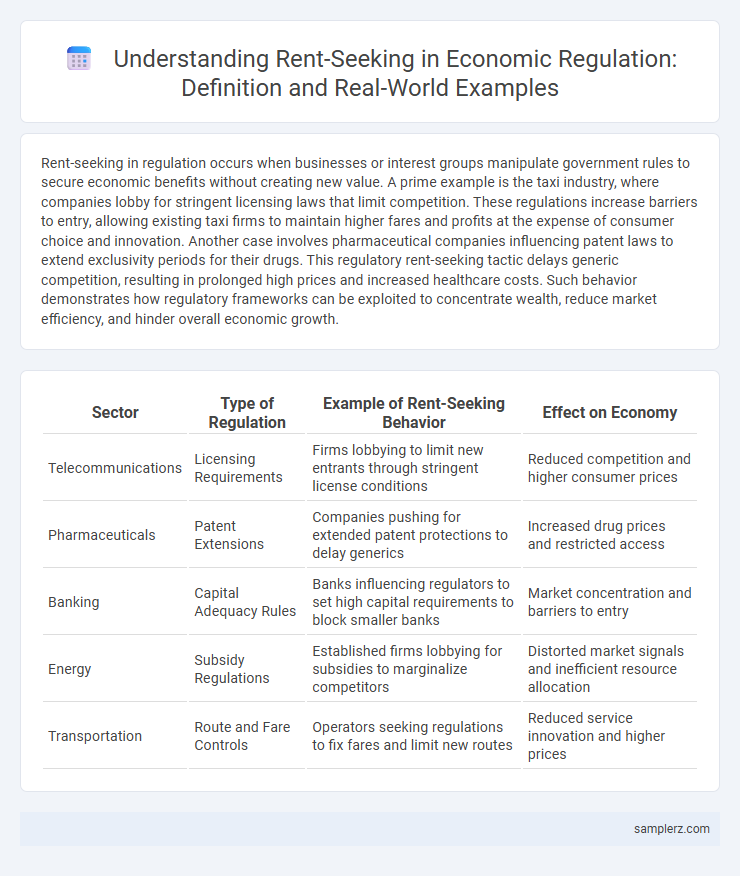Rent-seeking in regulation occurs when businesses or interest groups manipulate government rules to secure economic benefits without creating new value. A prime example is the taxi industry, where companies lobby for stringent licensing laws that limit competition. These regulations increase barriers to entry, allowing existing taxi firms to maintain higher fares and profits at the expense of consumer choice and innovation. Another case involves pharmaceutical companies influencing patent laws to extend exclusivity periods for their drugs. This regulatory rent-seeking tactic delays generic competition, resulting in prolonged high prices and increased healthcare costs. Such behavior demonstrates how regulatory frameworks can be exploited to concentrate wealth, reduce market efficiency, and hinder overall economic growth.
Table of Comparison
| Sector | Type of Regulation | Example of Rent-Seeking Behavior | Effect on Economy |
|---|---|---|---|
| Telecommunications | Licensing Requirements | Firms lobbying to limit new entrants through stringent license conditions | Reduced competition and higher consumer prices |
| Pharmaceuticals | Patent Extensions | Companies pushing for extended patent protections to delay generics | Increased drug prices and restricted access |
| Banking | Capital Adequacy Rules | Banks influencing regulators to set high capital requirements to block smaller banks | Market concentration and barriers to entry |
| Energy | Subsidy Regulations | Established firms lobbying for subsidies to marginalize competitors | Distorted market signals and inefficient resource allocation |
| Transportation | Route and Fare Controls | Operators seeking regulations to fix fares and limit new routes | Reduced service innovation and higher prices |
Classic Cases of Rent-Seeking in Regulatory Policy
Classic cases of rent-seeking in regulatory policy include taxi medallion systems, where existing license holders leverage regulations to restrict market entry and inflate prices. Another example is the pharmaceutical industry's patent extensions that delay generic competition, preserving monopoly profits. Utility companies often lobby for regulatory tariffs that guarantee above-market returns, effectively transferring consumer wealth to producers.
Regulatory Capture: Real-World Examples
Regulatory capture occurs when regulatory agencies prioritize the interests of the industries they oversee, leading to rent-seeking behavior. A notable example is the U.S. Federal Aviation Administration's lenient oversight of airlines, influenced by industry lobbying to avoid stricter safety regulations. This results in weakened regulation, favoring corporate profits over public welfare and distorting competitive market dynamics.
How Licensing Laws Enable Rent-Seeking
Licensing laws create barriers to entry by requiring costly permits, allowing existing businesses to exploit their position and extract economic rents without providing additional value. These regulations limit competition, resulting in higher prices and reduced innovation as firms focus on maintaining privileges rather than improving efficiency. Consequently, rent-seeking behavior increases as incumbents invest resources into influencing regulatory policies instead of productive economic activities.
Tariffs and Trade Barriers as Rent-Seeking Tools
Tariffs and trade barriers exemplify rent-seeking in regulation by enabling domestic industries to secure economic rents at the expense of consumers and international competitors. These protectionist measures increase import costs, reducing market competition and allowing favored firms to maintain higher prices and profits without improving efficiency. Economic studies show that such rent-seeking activities distort trade flows, lower overall welfare, and create deadweight losses in the economy.
Environmental Regulations Exploited for Private Gain
Environmental regulations, originally designed to protect ecosystems and public health, can be manipulated by corporations engaging in rent-seeking behaviors to gain competitive advantages. Companies may lobby for stricter standards that disproportionately increase costs for competitors or create barriers to entry, effectively securing market dominance under the guise of compliance. Such exploitation of environmental policy distorts markets, reduces innovation, and leads to inefficient resource allocation, ultimately harming economic welfare.
Financial Industry Regulations and Rent-Seeking Behavior
Financial industry regulations often create opportunities for rent-seeking behavior when firms lobby for policies that limit competition, such as stringent licensing requirements or complex compliance standards. These regulatory barriers increase entry costs, enabling established banks and financial institutions to maintain market dominance and extract economic rents without enhancing consumer value. Rent-seeking in this context reduces market efficiency and innovation, ultimately leading to higher costs for consumers and slower economic growth.
Pharmaceutical Patents and Regulatory Rent-Seeking
Pharmaceutical companies engage in regulatory rent-seeking by lobbying for extended patent protections that limit generic drug competition, thereby maintaining high prices and market exclusivity. These extended patents often result from regulatory frameworks that prioritize innovation incentives but can be manipulated to delay entry of affordable generics. This rent-seeking behavior leads to significant economic inefficiencies and increased healthcare costs worldwide.
Zoning Laws: Rent-Seeking in Urban Development
Zoning laws often serve as a classic example of rent-seeking in urban development by enabling landowners and developers to influence regulations that limit competition and increase property values. These regulations create artificial scarcity by restricting land use and development density, which can lead to inflated housing costs and reduced availability. Such rent-seeking behavior distorts market efficiency and disproportionately benefits vested interests at the expense of broader community welfare.
Energy Sector Regulation and Rent-Seeking Practices
Energy sector regulation often creates opportunities for rent-seeking when firms lobby for favorable subsidies, tariffs, or exclusive licenses, distorting market competition and driving up consumer costs. Regulatory capture occurs as incumbent energy companies influence policymakers to erect barriers against new entrants, preserving their market dominance and limiting innovation. Such rent-seeking practices reduce overall economic efficiency and hinder the transition to sustainable energy solutions.
Agricultural Subsidies: A Regulatory Rent-Seeking Example
Agricultural subsidies illustrate regulatory rent-seeking by enabling powerful farming lobbies to secure government payments that distort market competition and inflate prices for consumers. These subsidies often protect inefficient producers, reducing incentives for innovation and productivity improvements in the agricultural sector. The economic inefficiency created by such rent-seeking contributes to misallocation of resources and hampers overall agricultural market performance.

example of rent-seeking in regulation Infographic
 samplerz.com
samplerz.com